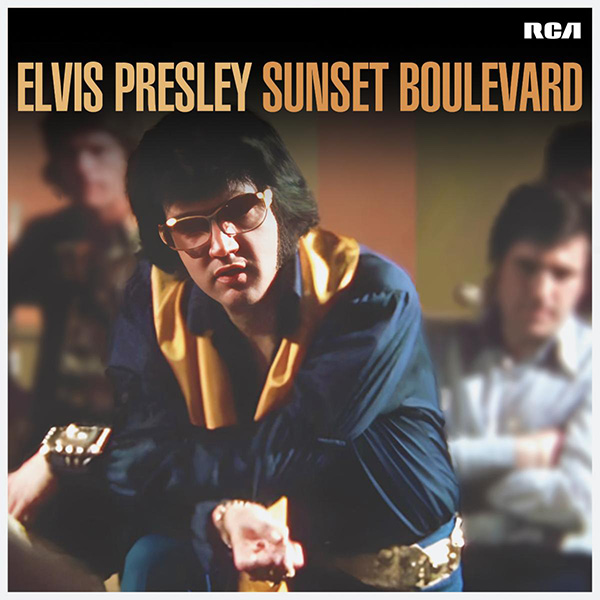
https://www.stereophile.com/content/nov ... rd-reviews
Elvis Presley: Sunset Boulevard
RCA/Legacy 19802905512 (5 CDs). 2025. Ernst Mikael Jørgensen, prod.; Matt Ross-Spang, Vic Anesini, engs.
Performance ****
Sonics **½ ****
While Ozzy Osbourne's longevity despite a heroic effort at self-destruction was a near miracle, the audible proof of rockstar immortality lies in the seemingly endless trail of posthumous releases of long-dead stars like Jimi Hendrix and Elvis Presley. A barrel that may be nearing its bottom, the Presley RCA archives continue to be explored by the longtime, indefatigable Presley reissue producer Ernst Mikael Jørgensen.
There's only one previously unreleased track in this new set, which collects everything Presley recorded at RCA's Hollywood Studios between 1972 and 1975. Included are the master takes from sessions held in 1972 and 1975, whose output later appeared on the studio albums Separate Ways (1972), Elvis (1973), Today (1975), and a variety of later compilations. Also included are rehearsals recorded leading up to his 1970 and 1974 Las Vegas residencies. Available in both a five-CD set and a double vinyl LP version, these tracks appear here without the overdubs that were added later.
By the mid-1970s, Elvis was constantly touring America but recording less and less, despite RCA's demand for a new studio album. When he did deign to enter a studio, he was primarily interested in recording sentimental, sometimes maudlin ballads. One of the greatest was "Always on My Mind," which was originally released in 1972 as the B side of the "Separate Ways" single. This impassioned mea culpa, which was recorded just after his divorce from wife Priscilla, went to the Top 20 in Hot Country Singles. Other warm and earnest performances from the 1972 session include "Where Do I Go from Here" and a heartfelt cover of Kris Kristofferson's "For the Good Times."
To his credit, Elvis was old-school about the recording process. He wanted sessions to go on without a time limit. He recorded live with the entire band playing with him on the studio floor; he did not overdub his vocals later.
Once he was done in the studio, however, Elvis had little interest in what happened to his recordings. He allowed his producer, most often Felton Jarvis, to mix and master the tapes and to choose the master takes. An outtakes disc collects extras from both the 1972 and 1975 album sessions, many them previously released on 2001's 6363 Sunset from the BMG Presley specialty label Follow That Dream.
Having come up in the 1950s, Presley thought in terms of singles—never in terms of coherent albums that tell a story. By the 1975 sessions, the song selection—what Elvis was interested in—had become slack and uninspired. His lifestyle had taken a toll on his voice. But for several of these tracks, he was able to rouse some of the old spirit. In his rendition of "Shake a Hand," a 1953 hit for Faye Adams, he calls for an extra chorus. Even lugubrious ballads like "Green, Green Grass of Home," which had already become a hit for Presley friend Tom Jones, and especially "And I Love You So," have their moments. He is obviously having fun in a loose, partial take on his onetime showstopper "Tiger Man," but his voice sounds thin and small, as if someone else is singing.
A huge factor in Elvis's live performances and on albums like Today is the professionalism of the TCB band. Anchored by guitarist James Burton, bassist Jerry Scheff, keyboardist Glen D. Hardin, and drummer Ronnie Tutt, they were engaged, adaptable, and hard to fool. Most of them later became part of Emmylou Harris's Hot Band. The discs documenting the rehearsals for the 1970 and 1974 Las Vegas residencies are both the high and low points of this set. In 1970, Elvis was still in the middle of his career resurgence ignited by his 1968 comeback special. The TCB band was brand new. In the 34 tracks from the 1970 rehearsals, he's the lighthearted Elvis fans love to imagine as he runs through covers of "Johnny B. Goode," "Polk Salad Annie," and "Sweet Caroline." While there are takes of "Suspicious Minds" and "Stranger in My Hometown," it's always striking how fast the material recorded with producer Chips Moman, which revitalized his career, disappeared from his live set list.
Overall, the sonics of the 1974 rehearsals are less than ideal. They were badly miked and not nearly as clear or full as the 1970 tracks. Elvis's vocals are often fuzzy and distorted, and when he turns to an upbeat number like "Proud Mary," the limits of his voice become obvious.
This is a well-done package collecting late-career Elvis, warts and all.—Robert Baird

